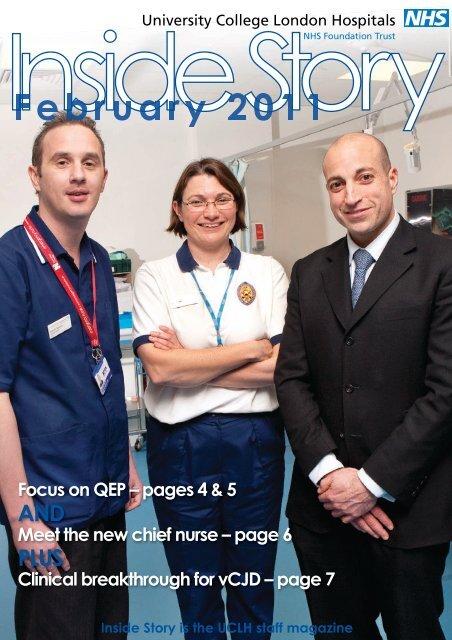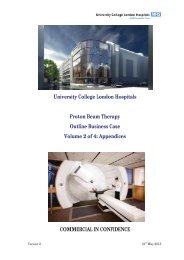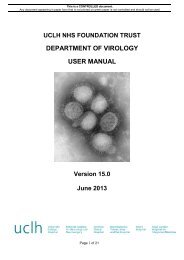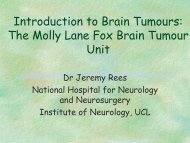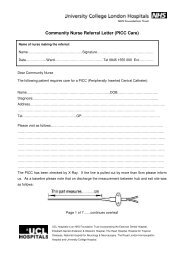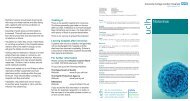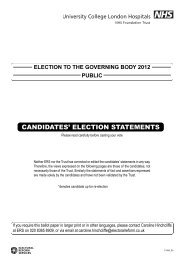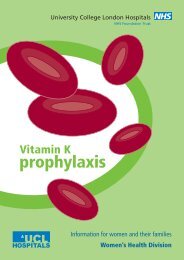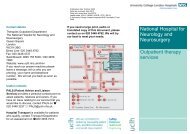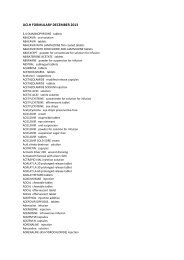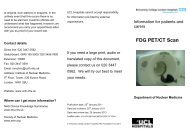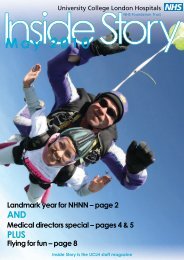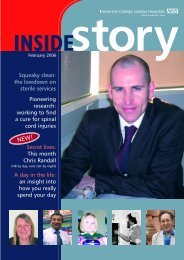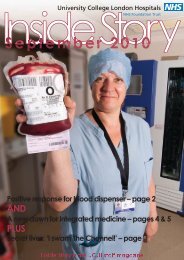Inside Story - University College London Hospitals
Inside Story - University College London Hospitals
Inside Story - University College London Hospitals
You also want an ePaper? Increase the reach of your titles
YUMPU automatically turns print PDFs into web optimized ePapers that Google loves.
<strong>Inside</strong> <strong>Story</strong><br />
Focus on QEP – pages 4 & 5<br />
AND<br />
Meet the new chief nurse – page 6<br />
PLUS<br />
Clinical breakthrough for vCJD – page 7<br />
<strong>Inside</strong> <strong>Story</strong> is the UCLH staff magazine
news<br />
Top young artists brighten Cancer Centre<br />
Fifteen of <strong>London</strong>’s top young artists are<br />
to brighten UCLH’s new Macmillan<br />
Cancer Centre with their work.<br />
The original art, on the theme of<br />
wellbeing, will decorate patient areas<br />
when the £100m new centre opens in<br />
2012.<br />
Copies of the eye-catching collection<br />
have already gone on display outside the<br />
construction site in Huntley Street where<br />
they will remain for the next 12 months.<br />
A third edition will be auctioned at a<br />
<strong>London</strong> gallery in March next year with<br />
all proceeds to the centre.<br />
UCLH Arts curator, Guy Noble said:<br />
“They are fantastic original art works<br />
created by some of <strong>London</strong>’s best up<br />
and coming young talent.<br />
“They are humorous, distracting, thought<br />
provoking and uplifting and this fits with<br />
our commitment to provide the best<br />
possible environment for patients when<br />
they are receiving treatment from us.”<br />
He added: “Displaying the eye-catching<br />
designs outside the centre will help raise<br />
public awareness of the development<br />
and being able to auction copies next<br />
year will raise valuable funds for the<br />
centre. We are very grateful to the artists<br />
for their support.”<br />
For further information or to request<br />
images please contact the arts curator,<br />
Guy Noble.<br />
Dedicated healthcare assistants win awards<br />
Three staff have won praise for the<br />
contribution they make to patients and<br />
healthcare across the Trust. They were<br />
presented with awards in memory of<br />
Christine Harcourt-Smith, a former UCH<br />
nurse who died unexpectedly at the age<br />
of just 26.<br />
Contact Us<br />
If you have any information you would like included in <strong>Inside</strong> <strong>Story</strong>, or on the Trust intranet<br />
site Insight, contact: Communications Unit, 2nd Floor Central, 250 Euston Road, <strong>London</strong><br />
NW1 2PG. Email: communications@uclh.nhs.uk, Tel: ext 9897, Fax: ext 9401.<br />
2<br />
Annette, Margarita and Dexter show off their certificates,<br />
alongside Barbara Baer, President of the UCH Nurses’ League<br />
Carlos ‘Dexter’ Regarde has made a big<br />
impact in a short time since joining<br />
UCLH last March. He was named<br />
Healthcare Assistant of the Year for his<br />
'exceptional ability to communicate, his<br />
welcoming and caring manner and his<br />
enthusiasm and commitment to<br />
learning’.<br />
Margarita Petrus Camps<br />
won an award to recognise<br />
her achievements whilst<br />
training to be a registered<br />
nurse. Margarita<br />
approached the course with<br />
‘commitment and maturity’<br />
and her academic<br />
development led to her<br />
achieving the BSc in<br />
Nursing Studies.<br />
Annette Sylvester was<br />
presented with the award<br />
for Registered Nurse<br />
Mentor. Nominated by staff nurse Faye<br />
Stemp and senior nurse Alison Finch,<br />
Annette was commended for her<br />
'friendly, calm and considered approach'<br />
in mentoring paediatric nursing students<br />
and for the way she provides them with<br />
a rich learning experience’.<br />
The awards were established as a<br />
lasting memorial to Christine Harcourt-<br />
Smith (pictured left) who qualified in<br />
1971 and became a staff nurse on the<br />
metabolic ward. In 1976 – just six weeks<br />
after becoming engaged to be married –<br />
she died suddenly of a brain tumour. Her<br />
mother Irene donated money to the<br />
Nurses’ League to establish an annual<br />
award in her name.<br />
Sheila Adam, head of nursing specialist<br />
hospitals board, said: “Health care<br />
assistants are a vital part of our nursing<br />
team, and contribute hugely to the<br />
quality of care our patients receive.”<br />
Front cover: Darren Barnes, charge nurse,<br />
Sophia Mavrommatis, physiotherapy<br />
practitioner and Fares Haddad, consultant<br />
orthopaedic surgeon. (<strong>Story</strong> on page 3)
news<br />
Midwifery award for our pioneering staff<br />
All the RCM winners with Cathy<br />
Warwick, second from left; Yana<br />
Richens, third from left; Sarah<br />
Creighton, fifth from left; and<br />
Natasha Kaplinsky, fifth from right<br />
Two consultants have won one of the<br />
UK’s top midwifery prizes for their<br />
innovative work to help women whose<br />
lives are scarred by genital mutilation.<br />
Yana Richens OBE, consultant<br />
midwife and Sarah Creighton,<br />
consultant gynaecologist were<br />
presented with the award by the<br />
Royal <strong>College</strong> of Midwives for their<br />
educational DVD which gives clinical<br />
advice on how to repair the damage<br />
caused by female genital mutilation<br />
(FGM).<br />
The procedure is offered at the Trust’s<br />
African Women’s Clinic which also<br />
gives advice to women who suffer<br />
problems related to FGM.<br />
Cathy Warwick, RCM general<br />
secretary, praised their ‘important,<br />
innovative and pioneering work’.<br />
Yana said: "I feel passionately about<br />
highlighting the issue of health<br />
inequalities for non-English speaking<br />
women and those from ethnic<br />
minorities. Female genital mutilation<br />
ruins many women's lives and can<br />
cause severe gynaecological and<br />
obstetric problems.<br />
“I have been fortunate to be able to<br />
work in an environment where I have<br />
the resources, support and freedom<br />
to develop professionally”<br />
Sarah added: “Patients with FGM are<br />
at much greater risk during childbirth<br />
if they are not assessed and<br />
managed appropriately. This DVD<br />
provides immediate and practical<br />
instruction to doctors and midwives”.<br />
The DVD has received national and<br />
international recognition from the<br />
Royal <strong>College</strong> of Obstetricians, Royal<br />
<strong>College</strong> of Midwives and WHO. It<br />
educates midwives, doctors and<br />
traditional birth attendants, as well as<br />
people in local communities.<br />
ER – just what the doctor ordered<br />
Imagine being admitted to hospital<br />
and knowing what to expect at each<br />
stage, from the moment you come in<br />
until you go home. Imagine waking up<br />
after surgery and feeling well enough<br />
to talk, eat and drink and be<br />
comfortable enough to be back on<br />
your feet soon afterwards.<br />
Orthopaedic patients at UCLH are the<br />
latest to benefit from the enhanced<br />
recovery (ER) programme to make<br />
their hospital stay less daunting,<br />
boost recovery and reduce length of<br />
stay. It offers patients advice and<br />
practical support before, during and<br />
after their knee or hip replacement.<br />
New education groups have been<br />
set up to give people the<br />
opportunity to meet other patients<br />
and members of the nursing,<br />
occupational therapy and<br />
physiotherapy teams before<br />
admission. They can seek<br />
reassurance, find out the full facts,<br />
practice exercises, and try out stairs<br />
and equipment to help walking and<br />
dressing.<br />
Pre-assessment, same day<br />
admission and excellent surgical<br />
and anaesthetic management are<br />
also key elements of the<br />
programme. The ER pathways have<br />
already been established in the<br />
Trust’s colorectal,<br />
bariatric and<br />
cardiothoracic<br />
services.<br />
Sophia<br />
Mavrommatis,<br />
physiotherapy<br />
practitioner, said:<br />
“The group<br />
sessions have been very popular and<br />
patients say it offers them<br />
reassurance. We are also planning to<br />
produce a DVD for patients, updated<br />
patient information booklets and an e-<br />
learning package for new staff which<br />
will explain the ethos behind the<br />
enhanced recovery pathway.”<br />
The North Central <strong>London</strong> Enhanced<br />
Recovery Partnership is part of a<br />
national initiative supported by<br />
the Department of Health.<br />
ER – linked to reduced<br />
length of stay – is part of the<br />
Quality, Efficiency and Productivity<br />
programme. See centre pages for<br />
the latest update on QEP.<br />
3
quality, efficiency and productivity<br />
QEP: one year on<br />
A series of special events are on the horizon to mark the first<br />
anniversary of the Trust’s Quality, Efficiency and Productivity (QEP)<br />
programme.<br />
Staff are invited to activities and workshops to showcase and share<br />
the impressive work that is underway across the Trust. National NHS<br />
efficiency lead Jim Easton returns as guest speaker.<br />
In this edition of <strong>Inside</strong> <strong>Story</strong>, we are looking at the achievements of the<br />
past year – ways we have improved quality of care, treated more patients<br />
and saved money. Plus, we’ll be looking at the important challenges that lie<br />
ahead.<br />
For more information on QEP week, which is<br />
beginning on 28 February, click the QEP button on<br />
the front page of Insight.<br />
Improving the way we care for the elderly<br />
The elderly care team has redesigned the way it cares for patients to help them<br />
recover quickly. As well as proving popular with patients, 1,542 bed days have<br />
been saved. This is helping us treat more people needing care.<br />
How did they do it?<br />
Elderly patients are now assessed by a<br />
specialist consultant soon after arriving on the<br />
Acute Medical Unit, rather than when<br />
transferred to a ward. Care is coordinated from<br />
the outset and often requires a complex<br />
package of health and social care assessment.<br />
Once on the ward, nursing staff regularly visit the bedside to reassure and support<br />
the elderly patients.<br />
The team has achieved the highest pre-11am discharge<br />
in the trust with 40% of patients leaving hospital<br />
promptly in the mornings.<br />
Regular outpatient clinics with specialist consultants help<br />
minimise re-admissions.<br />
Success stories<br />
QEP champions<br />
among those who<br />
Trust's Improvem<br />
provides practical<br />
to help them del<br />
projects in the<br />
We are on target to save £32m this financial year<br />
Streamlining surgery<br />
Clinical teams at the NHNN have worked hard to<br />
reduce the length of time non-elective patients stay in<br />
hospital before and after their operation. For<br />
example, where patients have been transferred from<br />
other hospitals for specialist brain and spinal surgery,<br />
the average stay is down from 16 to 13 days.<br />
How has this been achieved?<br />
Surgery times are booked as soon as a patient is<br />
accepted for treatment and admissions planned more<br />
thoroughly. Improved communication means patients<br />
on urgent standby are fully ready for their operation at<br />
short notice.<br />
Post surgery, length of stay was shortened by more<br />
efficient assessments after the operation; improved<br />
protocols and a new discharge lounge has<br />
streamlined transfers to another hospital or home.<br />
Developing strong relationships and high levels of<br />
trust with teams in partner hospitals has been vital.<br />
The number of agency staff has been halved,<br />
saving around £12m. But the aim is to have no<br />
agency staff, (achieved by maternity, paediatrics,<br />
medical specialities and infection division last<br />
month)<br />
We are treating more patients than ever before<br />
We have reduced waiting times (eg IVF clinic);<br />
reduced length of stay following surgery (eg The<br />
Heart Hospital and care of the elderly); increased<br />
outpatient care; increased theatre use at UCH by<br />
10%; increased pre-11am discharge across all<br />
areas<br />
Quality indicators are performing well, with<br />
mortality rates now among the best in the<br />
country, and recently at a record low for the<br />
Trust<br />
4
quality, efficiency and productivity<br />
: These staff are<br />
've signed up to the<br />
ent Network, which<br />
support and training<br />
iver QEP inspired<br />
ir departments.<br />
Reduced delays sweeten the pill<br />
With the help of the pharmacy team, T6 nursing staff are being<br />
trained to dispense painkillers and other simple medications directly<br />
to patients – a move to help end frustrating delays and ensure the<br />
discharge process runs as smoothly as possible.<br />
How will it work?<br />
The pre-packaged medicine will be stored safely on the short stay<br />
surgical ward and dispensed against a pre-formatted discharge<br />
prescription. WebRx, the Trust’s eDischarge system, is also being<br />
modified so that doctors can prescribe specific and pre-agreed<br />
combinations of medicines with a single click.<br />
To next year – and beyond!<br />
Ward sister Naimh Gavaghan said: “Patients and staff can find it<br />
really frustrating to wait for the prescription to be prepared and the<br />
medicine to be dispensed, particularly if it is for a straightforward<br />
analgesic, laxative or antibiotic.<br />
“This will be much simpler and means patients can go home as soon<br />
as they are ready. It will help ward staff to run the whole discharge<br />
process more effectively. “<br />
Building on last year’s success, its now time to look ahead. The Executive Board has recently agreed the Trust strategy<br />
for the next five years, outlined in ‘Thriving through the Downturn’. You can read a summary of the strategy (during QEP<br />
week), or the full document, on the QEP pages of Insight.<br />
With £175m savings to be made by 2015, there are obviously challenges ahead – both in reducing costs and retaining<br />
high quality care. The support of staff will be vital in helping achieve this goal.<br />
Sir Robert Naylor, chief executive, said: “We will need the energy, commitment and ideas of all staff. Everyone needs to<br />
be involved to help us significantly change the way we work to meet this challenge whilst protecting the quality of care we<br />
provide to patients.” More details about the five year plan will be available during QEP week.<br />
Online QEP facts – just a click away.<br />
Visit the QEP pages on Insight<br />
for summaries of important<br />
national QEP publications,<br />
PowerPoint presentations,<br />
news updates and success<br />
stories.<br />
Please keep your comments<br />
and suggestions rolling in –<br />
email us at QEP@uclh.nhs.uk.<br />
Stop press:<br />
Jim Easton, national<br />
director for<br />
improvement and<br />
efficiency, is returning<br />
to give the keynote<br />
address at the QEP<br />
Trust-wide event next<br />
week. Jim is pictured<br />
here with chief executive Sir Robert Naylor and Tara<br />
Donnelly, the Trust’s QEP project director, at the QEP<br />
launch event in January 2010.<br />
5
interview<br />
Meet our new chief nurse<br />
Katherine Fenton talks to Elke Tullett<br />
New chief nurse Katherine Fenton<br />
vividly remembers her first shift as a<br />
staff nurse. It was in the late 1970s in<br />
a Leeds hospital and she felt, like<br />
most other relative rookies, a sense<br />
of bewilderment. It was the ward<br />
sister – a calm, confident, firm leader<br />
– who saved the day.<br />
“It was a gynae ward and there was<br />
a patient with a threatened<br />
miscarriage and I thought ‘what<br />
makes me think I have what it takes<br />
to help her?’ I was petrified. Luckily,<br />
the ward sister was fantastic. She<br />
was supportive, strict, had high<br />
standards and she ruled the ward.<br />
I’m not sure how I would have<br />
“I’m not a pen pusher. I<br />
want to get out there”<br />
survived the first day without her!”<br />
And that memory continues to shape<br />
her views.<br />
“We must continue to invest in our<br />
ward sisters, to make sure we have<br />
the best we possibly can. Their<br />
influence is so important and they set<br />
the standard for everyone else.”<br />
Nursing and midwifery care based on<br />
the ‘basics of what really matters to<br />
patients’ – are one of her priorities.<br />
“Whether patients are fed and watered<br />
properly, low infection rates,<br />
preventing falls and pressure ulcers –<br />
all the things that lead to first class<br />
care and reduce the risk of harm to<br />
patients.”<br />
Reducing harm to patients is always<br />
uppermost in her mind: she led the<br />
development of the NHS Institute for<br />
Innovation and Improvement national<br />
nursing and midwifery high impact<br />
actions aimed at reducing the risk of<br />
harm.<br />
“I want us to be among the best in the<br />
world for fundamental nursing care.<br />
UCLH is already so successful – the<br />
challenge is to take it to the next level.”<br />
Sitting behind a<br />
desk is not the<br />
answer. A highenergy<br />
person<br />
like Katherine<br />
(who enjoys<br />
running, skiing<br />
and sailing), will<br />
be pacing the<br />
corridors and<br />
wards of UCLH<br />
each week.<br />
“I’m not a pen<br />
pusher. I want to<br />
get out there, talk<br />
to as many<br />
nurses and<br />
midwives as I can – I hope to create<br />
the ambition among our staff, to<br />
make them see that we can be<br />
world class in all we do and that it is<br />
within their reach. They are the<br />
ones who can really make it<br />
happen, my job as chief nurse is to<br />
ensure they have the right facilities,<br />
the right training and the<br />
opportunities to help them achieve<br />
it.”<br />
Creating a more structured training<br />
and career pathway is on her<br />
agenda to encourage more nurses<br />
and midwives to become nurse<br />
consultants. So too, is<br />
strengthening nurse and midwifeled<br />
research.<br />
She acknowledges the ‘tremendous’<br />
legacy left by her predecessor<br />
Louise Boden “fantastic…there<br />
were no holes… no ‘oh God! Look<br />
at the mess I’ve got to sort out.’ She<br />
really was on top of everything.”<br />
Like Louise, Katherine shares a real<br />
love of grass roots nursing and<br />
midwifery – a feeling that grows<br />
stronger as the years go by.<br />
She spent many years in intensive<br />
neonatal care: “It’s intense, technical,<br />
caring – so many things. A patient will<br />
come in with a big belly – and leave<br />
with a baby in her arms. It is magic!<br />
“Trying to make sure every patient<br />
receives brilliant care is what drives<br />
me on, they deserve the same care as<br />
you would want for your own father,<br />
mother, and child. I may look friendly, I<br />
am friendly - but I can crack the whip if<br />
I see standards slipping.”<br />
CV<br />
Previously director of clinical<br />
standards and workforce/chief<br />
nurse at South Central Strategic<br />
Health Authority<br />
Career spans 30 years including<br />
posts at St James’s is <strong>University</strong><br />
Hospital, <strong>University</strong> Hospital<br />
Birmingham, director of nursing<br />
and patient services at<br />
Southampton <strong>University</strong><br />
<strong>Hospitals</strong> NHS Trust and at Barts<br />
and the <strong>London</strong> NHS Trust.<br />
6
Breakthrough discovery in blood test for vCJD<br />
The world’s first accurate<br />
blood test for variant<br />
Creutzfeldt-Jakob<br />
disease (vCJD) has been<br />
developed by the Medical<br />
Research Council (MRC),<br />
with help from staff at the<br />
National Hospital for<br />
Neurology and<br />
Neurosurgery (NHNN).<br />
The results could<br />
transform the diagnosis<br />
and screening of the<br />
brain disease.<br />
A widely available,<br />
accurate blood test would<br />
enable people to be<br />
diagnosed earlier and<br />
could also help identify<br />
carriers of the disease.<br />
This would help measure how<br />
widespread the prion infection is in the<br />
general population and identify those<br />
who are at risk of passing it on to<br />
others.<br />
The research team tested 190 blood<br />
samples, including 21 from individuals<br />
known to have vCJD. The blood test<br />
was able to detect blood spiked with a<br />
dilution of vCJD to within one part per<br />
Dr Simon Mead, clinical lead, and Prof John Collinge, director, of the National<br />
Prion Clinic<br />
ten billion – 100,000 times more<br />
sensitive than any other method<br />
developed so far.<br />
Variant CJD, the human form of BSE<br />
(or mad cow disease) first emerged in<br />
1995. The disease, which affects the<br />
brain, is believed to have passed from<br />
cattle to humans through infected food.<br />
It causes personality change, loss of<br />
body function, and eventually death.<br />
our trust<br />
Professor John Collinge,<br />
director of the Prion Unit<br />
based at the NHNN, said:<br />
“One of the reasons that<br />
vCJD is such a dreaded<br />
disease and has caused<br />
such disruption and<br />
expense to health services<br />
is the lack of knowledge of<br />
who is and who is not a<br />
carrier of this infection.<br />
Longer term studies will be<br />
needed to assess what<br />
proportion of individuals<br />
who test positive for prion<br />
infection will then go on to<br />
develop the disease later in<br />
life.<br />
“It will be crucial for<br />
clinicians to be able to offer<br />
treatment before extensive irreversible<br />
damage to the brain has occurred. At<br />
the moment, a firm diagnosis of vCJD<br />
can usually be made only once serious<br />
symptoms of the disease have<br />
developed which indicate extensive<br />
damage to the brain.”<br />
For more information visit the National<br />
Prion Clinic pages on the UCLH<br />
website.<br />
New cancer technology – a UK first<br />
Cancer patients at UCLH will be<br />
among the first in the country to benefit<br />
from exciting new technology which<br />
treats patients with greater precision<br />
and twice as quickly as conventional<br />
methods.<br />
The new TrueBeam® linear<br />
accelerator delivers precise<br />
radiotherapy and radiosurgery<br />
alongside real-time imaging and is<br />
particularly effective for lung, liver,<br />
pancreas and other mobile tumours.<br />
More than<br />
100,000 data<br />
points are<br />
measured every<br />
ten seconds<br />
during treatment<br />
to ensure the<br />
tumour is<br />
targeted with the<br />
utmost accuracy.<br />
It will also offer<br />
well targeted<br />
radiotherapy for<br />
some of the<br />
children treated<br />
at UCLH, which<br />
has the largest<br />
paediatric<br />
radiotherapy practice in the UK.<br />
Derek D’Souza, head of radiotherapy<br />
physics at UCLH, said: “TrueBeam®<br />
will offer patients new treatments using<br />
small, high-intensity fields of radiation<br />
to treat the tumour.It provides greater<br />
efficiency in the steps needed for<br />
imaging, positioning and treating<br />
patients and offers unparalleled<br />
precision.”<br />
The project is a partnership between<br />
HCA NHS Ventures and Fight for Life,<br />
a UCLH charity which has been raising<br />
funds to help fight children’s cancer for<br />
the past 14 years.<br />
Julia Solano, radiotherapy services<br />
manager, said the upgraded facilities<br />
and technical radiotherapy were a ‘UK<br />
first’. “It will be truly innovative,” she<br />
added.<br />
The UK’s first machine is expected to<br />
be up-and-running in the UCH<br />
radiotherapy department by the<br />
summer.<br />
7
the back page<br />
Secret lives<br />
By day, Taj Fregene gently eases<br />
people into the deepest of sleeps, at<br />
night he rouses them wide awake.<br />
Instead of mixing oxygen, anaesthesia<br />
and nitrous oxide, he mixes music. The<br />
controlled calm of the operating theatre<br />
may be replaced by the raucous<br />
revelry of a rock venue, but there are<br />
similarities too.<br />
Taj, a specialist registrar, said: “It can<br />
feel strange dealing with an emergency<br />
in the hybrid theatre in the afternoon<br />
and then a couple of hours later doing<br />
a sound check at a gig. Anaesthesia<br />
can be stressful and you have to make<br />
sure you have planned for every<br />
eventuality. That philosophy helps me<br />
on stage too. You must plan well - then<br />
if things start to go wrong<br />
unexpectedly, you can quickly put them<br />
right.”<br />
The five-piece band call themselves<br />
“Alchemy” -an upbeat fusion of hip<br />
hop, indie and pop with influences from<br />
90s Britpop and 70s<br />
Mowtown. They are busy<br />
making a name for<br />
themselves in clubs and<br />
pubs across north <strong>London</strong>.<br />
“I write about love and<br />
about the realities of<br />
life…songs about when it’s<br />
grey, rainy, you feel rubbish<br />
and you can’t be bothered<br />
to get out of bed. The lyrics<br />
are thought-provoking but<br />
the sing-along melody and<br />
catchy rhythms make<br />
people want to dance.”<br />
Taj, who lives in Tufnell Park, has been<br />
making music since he was a young<br />
lad.<br />
My mum liked glam rock and my dad<br />
preferred the Mowtown greats and I<br />
think they influenced my love of music.<br />
They’re my biggest fans!”<br />
As for fame and fortune, Taj is realistic.<br />
“As long as I can carry on writing<br />
songs and playing music I’ll be happy.<br />
Fame – if it happens, it happens…but<br />
I’m not banking on it. Besides, I like<br />
being an anaesthetist!”<br />
* You can see Alchemy perform at 229<br />
The Venue, 229 Great Portland Street<br />
on Sunday March 27th.<br />
www.ThisIsAlchemy.co.uk<br />
Archives<br />
Miss Godiva Thorold was the matron and Lady<br />
Superintendent of Nurses at The Middlesex Hospital.<br />
She trained at <strong>University</strong> <strong>College</strong> Hospital and was<br />
appointed to The Middlesex in 1870. Her working day<br />
was long, rising early and not going to bed before<br />
2.30am, after completing her correspondence. She was<br />
considered to be an authoritarian but improved<br />
conditions for nurses, by creating a pension which<br />
helped attract nurses to remain in charitable institutions<br />
rather than go in to private nursing, which paid more.<br />
She was very<br />
particular on<br />
uniforms, and had<br />
designed a dress<br />
for Lady<br />
Probationers<br />
(women who paid<br />
to train as nurses).<br />
It had a small train<br />
that covered their<br />
ankles so that<br />
when they needed<br />
to stretch across a<br />
patient or over a<br />
bed their ankles<br />
could not be seen<br />
by the medical<br />
students.She<br />
retired in 1905.<br />
Ward of the week<br />
T7<br />
T14<br />
Ward of the week is a QEP initiative that<br />
focuses on efficient patient discharge and<br />
celebrates hard working and successful<br />
teams. Here are some of our recent winners.<br />
Grant Mann, charge nurse on T14 south, said: “We were<br />
thrilled to achieve the Ward of the Week for Pre-11am<br />
discharge. It was the culmination of much hard work”.<br />
8


